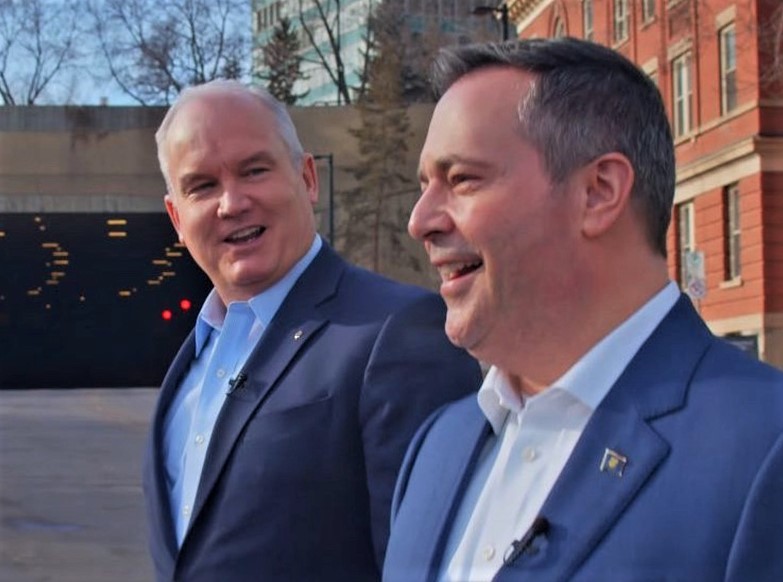Federal Conservative leader Erin O’Toole might be justifiably leery of being associated with Alberta Premier Jason Kenney, who has the lowest approval rating in the country. The campaigning O’Toole has positions distinct from Kenney on issues such as a carbon tax, and you won’t find recent photos of the two of them high fiving on stage.
But the former Harper cabinet colleagues are on the same page with child care. O’Toole has promised to scrap the Liberals’ deals aimed at providing universal $10-dollar-a-day child care largely funded by the federal government.
The Liberal approach polls well in most of the country, especially among women. But O’Toole would replace it with tax credits to parents, an approach that many Albertans prefer, particularly men, and particularly Jason Kenney.
So it’s worth taking a close look at the fight the Alberta premier has waged against the Liberal plan and unpacking his objections.
“Our first read of the federal policy announced yesterday is that it is only for a kind of cookie-cutter, nine-to-five, urban, government- and union-run institutional daycare option,” Kenney said in April.
Though Alberta came to the negotiating table with Ottawa, the two sides failed to reach the sort of agreement signed by seven provinces and three territories before the federal election was called, ending the talks.
O’Toole apparently liked what he saw.
The illusion of choice
The two objections of Kenney’s that get repeated most often are concerns that parents will have their choices diminished under a universal child-care system; and that such a system would fail to serve families in sparsely populated or remote areas.
The issue of choice is often framed as the federal government trying to impose a one-size-fits-all public scheme onto Alberta’s existing child-care system, 70 per cent of which is comprised of privately-owned operators, according to Minister of Children’s Services Rebecca Schulz.
It’s worth noting that there’s nothing especially unique about Alberta in this regard: according to 2019 data, the only provinces where a majority of child care up to age five is publicly delivered are Saskatchewan, Manitoba and Ontario. Newfoundland and Labrador’s rate of for-profit care is comparable to Alberta’s, and Quebec’s lauded child-care system, though largely publicly funded, is entirely privately operated (and 55 per cent for-profit) up to age five.
The federal government’s criteria for a deal include a focus on expansion of non-profit spaces, “while ensuring that families in all licensed spaces benefit from more affordable child care.”
In Alberta, private operators include incorporated non-profits, as well as a variety of for-profit entities such as day homes and corporate big-box daycare chains. They may or may not be “licensed” or regulated by the government; if not, they are not monitored and only visited by authorities in the event of a complaint.
Lindsay Tedds, an economist at the University of Calgary who has researched child-care systems, said that while parents generally prefer licensed care providers, they often can’t afford the higher fees even if they can find a spot.
The idea of preserving existing choice, she said, is a fallacy.
“What a lot of people call choice, especially when it comes to women’s needs and issues, it’s not choice, it’s constrained optimization. We have a number of different parameters that we’re trying to juggle, and we have to make a decision that is imperfect and inefficient because the system is imperfect and inefficient.”
The previous NDP government implemented the beginnings of a $25/day system, but Kenney’s UCP ended it in favour of direct subsidies to parents, arguing that parents know best. (Nevertheless, the subsidies are only available for parents with licensed child care.)
Schulz’s counteroffer to the federal government was to expand the direct subsidy program, raising the annual income threshold to $200,000 from $90,000. This, she said, would effectively halve fees on average within two years and reduce them to $10/day for most people.
Subsidies, however, are demand-side funding, which Tedds argues doesn’t address the problem.
“We need more supply,” she said. “A subsidy or refundable tax credit approach doesn’t build supply. We have wait lists everywhere.”
Rural parents left out… by the market
Questions about child care availability offer a segue to the second objection raised by the Kenney government to the federal offer: a concern that families outside of cities and towns will be left out.
Again, despite the framing of the provincial government, expansive rural areas are not something unique to Alberta. In fact, Alberta is one of the most urbanized provinces.
But the suggestion seems illogical on its face. If a rural community or region doesn’t have enough kids for a private operator to recoup their expenses, isn’t that precisely where the free market fails and government must step in?
“For me, it doesn’t make sense what the UCP is saying, because to fix that you need some kind of government intervention,” said Susan Cake, chair of advocacy group Child Care Now Alberta and an assistant professor at Athabasca University.
“The reason we don’t have rural child care right now is that governments have left child care to a free market model, and it is not a profitable venture to set up licensed child care in rural Alberta under the current conditions that we operate.”
Cake noted that there may be factors beyond population density that contribute, such as unlicensed operators in the area who don’t see the need to get licensed.
But regardless, parents in low-density or rural areas might have few if any options for child care without a public program.
‘Compelling’ evidence of benefits
If the merits of these two primary reasons the Alberta government has cited for its resistance to the federal program seem dubious, it’s also worth understanding the importance of universal child care — and how its benefits accrue well beyond parents and families.
A universal and accessible child-care system allows parents to return to work, particularly mothers — child care is a deeply gendered issue for many reasons, particularly persistent sexist pressures and expectations on women to be care providers first and foremost.
Enabling women to work if they wish to do so is critical for a post-pandemic economic recovery, and particularly relevant in Alberta, where the rate of unemployment for women is the highest it’s been since 1984.
A 2012 report by TD Economics said existing research demonstrating the long-term benefits of quality early childhood education to both children and society “compelling” and “overwhelmingly consistent.”
Consider Quebec, which has the country’s most comprehensive child-care program, with median fees at less than $200 per month. Introduced in 1997, by 2008 the $1.6-billion program was generating an extra $5.2 billion in economic activity — not only paying for itself, but turning a profit.
Jason Kenney: resistance icon
So why are Kenney and his government so reluctant to take the federal government’s offer?
Politics may be a partial explanation. More government support for child care is popular across the country, but in Alberta 65 per cent want that support to be provided directly to families rather than child-care providers, suggesting that the UCP’s approach has support beyond their base.
Ideology also plays a significant role. Shrinking the size of government and privatizing public services reflect not only a modus operandi but a core tenet of Kenney and his government.
It may be much simpler, however.
“There’s a few moving parts here, but I think the biggest is that they just don’t want to work with this federal government,” said Melanee Thomas, a political scientist at the University of Calgary.
“No other province has these issues. We’re looking at other conservative premiers who have been really hostile to this federal government because of partisan reasons, and even they’re looking at the federal money on the table and saying, ‘Ooh, that’s a problem if we let that go.’”
The timing of the negotiations, and their failure, might raise eyebrows. After all, Kenney doesn’t want to give Albertans any reason to vote Liberal by signing a child-care agreement that would only be valid if the Liberals were re-elected.
“It would have been great [for the Liberals] if they could campaign saying, ‘Re-elect us or your $10-a-day child care goes,’” said Thomas, adding that the failed talks may actually offer them a silver lining.
“I think it actually serves Justin Trudeau better to be able to say, ‘Look, we came to the table with this and that guy, your premier, doesn’t want to come and talk to us about it. Is that the approach to politics that you want? If not, then give me a mandate to keep going.’”
Depending on the outcome of the election, resumed talks may be in the offing: a spokesperson for Schulz confirmed that, “in spite of the federal Liberals’ treatment of Alberta to date, we remain optimistic that a deal can be reached should they be re-elected.”
‘Straight-up sexism’
Given that the most direct benefit of universal child care is to women, can refusing to implement it be viewed as a form of sexism?
“This would seem to cross that threshold,” said Cake, pointing out that the child-care jobs that would be created would predominantly be filled by women.
“It does not look great.”
Thomas agreed.
“It’s hard not to see the straight-up sexism in the failure to act on this,” she said.
“Are they going to come out and say they don’t want women to work? No, but we can also see in the way that they talk about economic recovery and their economic policies that it is heavily masculinized, and they don’t really think about women’s contribution to the labour force,” said Thomas.
“I think there’s some pretty pernicious sexism that’s informing some of this.”
It’s possible that Alberta may yet strike a deal with a re-elected Liberal government. In any case, Kenney’s government won’t have to ask Albertans for another mandate for two more years. By then, child-care fees in at least eight other provinces may have fallen by 50 per cent, if those targets are achieved.
Time will tell if Alberta’s rejection of the federal child-care offer is good or bad politics for Kenney. But all available evidence suggests it will be bad for Albertans.
Which means Erin O’Toole’s approach to child care is a poor option for Canadians. ![]()
Read more: Politics

















Tyee Commenting Guidelines
Comments that violate guidelines risk being deleted, and violations may result in a temporary or permanent user ban. Maintain the spirit of good conversation to stay in the discussion.
*Please note The Tyee is not a forum for spreading misinformation about COVID-19, denying its existence or minimizing its risk to public health.
Do:
Do not: